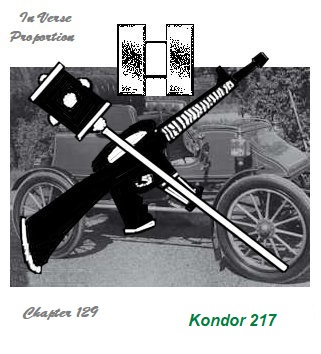
Patreon or PayPal Me keeps this site and its author alive. Thank you. |
Stories from the Verse
In Verse Proportion
Chapter 129: Kondor 217
Table of Contents
Previous chapter: Brown 237

Kondor spent some of his time at the engineering department, listening to conversations about progress on the various projects. It gave him opportunity to practice that translation skill, and also was an interesting study in the history of the development of technology. They were going through many of the steps he was certain his ancestors had trod.
Listening, he had a realization, and called over the professor.
“Professor,” he began.
“Choe?” came the reply. The voiced “J” that started his name had never been one the parakeets could easily master.
“I think Bob and Zeke have overlooked one or maybe two important inventions, probably because they’re not things you sell, exactly, but things you use to make the things you sell.
“Oh?”
“Yes, well, the first you might already have, but it’s critical to the second. We call it interchangeable parts.” He found the words, but of course they were just words, and in this case did not prove that they had them--or indeed, it might be that they called them something else.
“Interchangeable parts?”
“Yes. The idea is--take the gear mechanism in the revolver you’ve built. It has several parts that all have to fit together. Right now you’re apparently hand crafting each of the parts, carving and molding them to fit together, each gun unique. If a part breaks, you take the gun to a craftsman who fashions another part to replace it.”
“You have a different idea.”
“Instead of making each part individually, you mold dozens, possibly hundreds, of each part, each exactly the same. So you have a hundred of the small gears, and if the one in the gun breaks you remove it and replace it with an identical gear. And if you have twenty guns, the parts can be used to fix any of them.”
“I think they actually do that with steam engines. It’s a good idea.”
“It then makes possible another idea. For your revolvers, you make, or get someone to make, hundreds of parts of each type. The way you’re doing it, one of your builders goes to all the boxes getting one of each part, takes them to his bench, and puts them together. But it would be more efficient if you had one long bench and a half dozen builders. The first bird takes a housing with the barrel, and installs the trigger mechanism; he passes it to the bird next to him, who installs the hammer while the first bird is doing the next trigger installation, and he in turn gives it to the next bird, who installs the cylinder system, and so on until the entire weapon has been assembled. No one has to go gather all the parts, and each worker becomes good at his particular part of the job, and guns are being made constantly.”
“I see. I’m not sure that would make much difference, other than the part about having all the parts the same.”
“It might not for something like a gun--but when you start building cars, there are just too many parts for someone to have them all together in one place, and too many jobs for any one bird to be good at all of them. If you put the bottom of the car on a belt and move it along in a long building, you can have birds stationed along the way who install brakes, wheels, tires, seats, and so on, and you can have a second line in which the parts of the motor are assembled, which converges with the first line at the place where it’s time to put the two together, and then add the radiator and whatever else until the car is completed. As it is now, either you need one bird who knows how to do everything, or they have to take turns working on it together. If you put it on this conveyer belt, you can move the car from bird to bird and roll it off the end complete, each bird having the tools and parts he needs at his station, and none of them waiting for the work space to be cleared so they can work on the next car--or gun or radio or whatever you’re making.”
“I guess that makes sense.”
“Yes, and it’s essential to mass production.”
“Mass production?”
“If you’re making one car at a time, you have to sell them at very high prices, and only rich people can buy them. If you set up an assembly line, you can produce cars cheaply and quickly, and ordinary birds can afford them.”
“Yes, I see. I did not realize you were an economist, Choe.”
“I don’t know that I am, but this is how it was done in my world, and it moved things like cars and radios from toys for the rich to household necessities. So, good luck with it.”
There is a behind-the-writings look at the thoughts, influences, and ideas of this chapter, along with twenty other sequential chapters of this novel, in mark Joseph "young" web log entry #456: Versers Prepare. Given a moment, this link should take you directly to the section relevant to this chapter. It may contain spoilers of upcoming chapters.
As to the old stories that have long been here:

